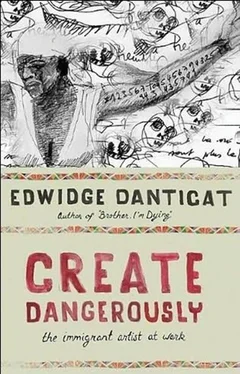May these words bring wings to your feet,
Edwidge Danticat
Summer 1999
Our last two days in Beauséjour proceed like most reunions, with the awe of reconnecting with a loved one slowly being replaced by daily routine. Uncle Joseph and Nick lose themselves in the details of the school while Tante Ilyana and I talk less and less, to avoid, I suspect, speaking of separation. There are already so many separations in our family, constant departures and returns. We cannot afford to curse or avoid these exits and migrations, however, because they have earned us whatever type of advancement we have made. Tante Ilyana’s son Renel, for example, had to spend most of his life away from her in order to become a dentist, while her daughter Jeanne, who stayed behind with her, died an agonizing and prolonged death, showing Tante Ilyana that some departures are inevitable, which is why Jeanne’s children now live in the capital with their father’s relatives and visit Beauséjour only in the summer.
The night before we are to leave, I am lying on my back in the bed where Tante Ilyana’s husband used to sleep, listening to her chatter in her sleep. Mid-dream, she laughs and makes promises. “Listen,” she says. “Come back soon. I’ll send you coffee.”
In the dark, I imagine that from here she can talk to all of us across these long distances, to my father, her parents, my brothers, and their children. And while I am making this silent invocation, Tante Ilyana awakens herself from yet another dream and whispers from across the room, “Edwidge, are you sleeping?
I say, “No. But it is not you who is keeping me awake.”
It is the mountains maybe, it being so quiet here at night that you hear everything, the swing of every tree branch, the bubbling of the stream, the footsteps of night travelers and wandering animals. And I listen for everything because I know it won’t always be so. I listen too closely and sometimes the listening gets too loud.
The next morning as we are preparing to leave, Tante Ilyana presents me with a three-pound sack of coffee beans to bring to my father in Brooklyn.
“When he has a taste of this coffee,” she says, “it will bring him home.”
I marvel at the magic of this coffee of which Tante Ilyana is so certain. What if such a thing did exist, an elixir against fading memories, a panacea to evoke images of spaces lost to us, to instantly return us home. I thank Tante Ilyana for the coffee on my father’s behalf by telling her a story, something I knew about him and she didn’t. I tell her of going with my father to a Chinese herbalist in New York who was treating him for psoriasis and of the Chinese herbalist telling my father to stop drinking coffee or he would never be cured. And of my father saying, “Doctor, there must be another way,” because he would never give up coffee. And in one of those strange crossed-wire moments, my story gives Tante Ilyana pause, and she says that perhaps she shouldn’t send the coffee to my father if it means that he’d have psoriasis forever. I must convince her to give me the coffee again, and finally she does.
The next morning at five a.m., we start out, Uncle Joseph, Nick, and I, for our journey down the mountain. Our plan is to be halfway down by eleven a.m., before the sun gets too high in the sky, making it too hot to walk without fainting. We will stop briefly for lunch at the house of a friend of my uncle’s and then hike the rest of the afternoon, which would mean that we’d be in Port-au-Prince around seven or eight in the evening.
The trip up took us two days, but Nick and Uncle Joseph assure me that it will be faster going down since we are not stopping for the night. Besides, with gravity it is always easier to descend than to climb, even with a three-pound sack of coffee in my backpack.
My way of saying good-bye is always the same. I pretend that later in the day or the next day or the day after I will see the person to whom I am bidding farewell. It is the only way I can endure separations, large and small, without becoming totally incapacitated with sadness. Tante Ilyana’s way is more abrupt and formal and perhaps healthier. We kiss each other on the cheek as she lists the names of all the family members in New York to whom I should give her regards. She and Jeanne’s boys walk with us for a mile or so and then they stop walking and we continue on.
The journey down is, as my cousin and uncle predicted, much easier. Rather than walk in a straight line, I zigzag through the difficult roads, forming invisible Zs with my feet all over the mountain roads, which is, my uncle tells me, the way the peasants climb and descend these mountains with relative ease. This is why they don’t look as tired and burdened as I do when I finally reach Dabonne and climb with great relief into my cousin’s open-backed truck. That and the fact that they are used to it, my uncle says. “If you did this often enough you too would get used to it.”
I begin to worry about Tante Ilyana on the car ride back to the capital, imposing on her life visions of extreme comforts that are lacking even in mine. I imagine her having her own helicopter in which to travel to and from the market. I think of her bypassing the stream baths for a Jacuzzi. I see her on vacation, visiting the Statue of Liberty, Disney World, the Empire State Building, the Eiffel Tower. By some standards, she’s seen little of the world, but perhaps, I tell myself, her world is larger than all of these places. I remind myself that at least she has a simple life, which I have at different times attempted to replicate in arbitrary ways, by not buying too many clothes, too much furniture. At the same time, Tante Ilyana’s life seems far from simple. Her vocation is nothing less than to maintain our family’s physical legacy, to guard a very small house in the ancestral village, to sustain a faraway world to which we could return, if we wanted to, and find traces, however remote and faint, of who we are.
When I find out a year later that Tante Ilyana is dead, I am at my parents’ house babysitting my sixteen-month-old nephew Ezekiel, who had recently learned to run. It is no longer easy to keep Ezekiel still on my lap during serious conversations, as he wants to use his newly discovered mobility as much as possible: by skipping from spot to spot, from my father’s knees to mine, from the living room sofa to the window curtains to the television set, which, with his safety in mind, we have placed on the floor rather than on a teetering table. Ezekiel is also exercising his newly discovered oral abilities by shouting nonsensical words, and my father must compete with him as he says, “I had a call from Haiti just now and they told me Ilyana died.”
The grief on my father’s face is clouded with logistical figurations. It had taken a whole day for news of the death to travel to Port-au-Prince and then by telephone to us, which means that Tante Ilyana’s funeral has already taken place. Attending is not even an option.
Ezekiel shrieks with pride when he finally succeeds in turning on the television set by himself, and I’m grateful for the distraction, for having to run and save him from discoveries for which I fear he’s not ready.
Ezekiel squirms as I hold him in my lap and try to quiet him down, and I find in my efforts to keep him still-whispering his name in his ear, promising him sweets he’d never get, singing the alphabet song he loves so much-that he is the one who is momentarily saving my father and me from our sadness.
There is little to say, or neither my father nor I can find the words, so I offer a confession instead. This revelation also seems to interest young Ezekiel as he watches my trembling lips.
I tell my father that on the last day of my visit to Beauséjour, Tante Ilyana had given me three pounds of coffee for him, coffee that had been confiscated as “illegal agricultural transport” by customs officers at John F. Kennedy Airport in New York. I hadn’t told him about the coffee previously for fear that he would needlessly mourn something that in the end he’d never have. There is perhaps more I want to confess, but I know these disclosures will also not help with his sorrow or mine. I should have stayed much longer in Beauséjour, spoken more to Tante Ilyana. I should have pretended I was the journalist she believed me to be, asked her many more questions about the family, about herself. I shouldn’t have seen the visit as routine, as my uncle and cousin, who were then living in Haiti, had. I should have foreseen that it might be the last time I’d see Tante Ilyana. After all, she was old and far away. But all these regrets might have been as painful to ponder then in the mountains as they are now.
Читать дальше












